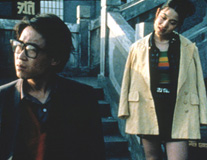|
Newest Reviews:
New Movies -
The Tunnel
V/H/S
The Tall Man
Mama Africa
Detention
Brake
Ted
Tomboy
Brownian Movement
Last Ride
[Rec]≥: Genesis
Hara-Kiri: Death of a Samurai
Indie Game: The Movie
Abraham Lincoln: Vampire Hunter
Old Movies -
Touki Bouki: The Journey of the Hyena
Drums Along the Mohawk
The Chase
The Heiress
Show
People
The Strange Affair of Uncle Harry
Pitfall
Driftwood
Miracle Mile
The Great Flamarion
Dark Habits
Archives -
Recap: 2000,
2001, 2002,
2003, 2004
, 2005, 2006,
2007 , 2008
, 2009 ,
2010 , 2011 ,
2012
All reviews alphabetically
All reviews by star rating
All reviews by release year
Masterpieces
Screening Log
Links
FAQ
E-mail me
HOME
| |
Xiao Wu (Jia Zhang Ke, 1997)
 Set in the Fengyang province, Chinese director Jia Zhang
Keís first feature Xiao Wu features young characters that suffer as
they bear witness to a foundling capitalist system. Because they were brought up
in the midst of a rapidly dissolving system (Maoism), they lack the ethical
foundation that would have given them the morality to help to keep the
developing capitalist marketplace free from corruption, and as such they find
their jobs on the fringes of the law as either money launderers, racketeers, or,
like the filmís would-be hero does, as a petty criminal. Every new freedom in
the free market brings with it the potential for corruption, and as a result,
the government responds with the first hints of fascism. Like the characters in
Jiaís pseduo-sequel Unknown Pleasures, these characters are wholly
uninformed about the massive upheaval going on around them. The film has a sense
of humor about their oblivious malaise, however. Consider the scene where a
seemingly omnipresent reporter interviews Xiao Wuís comrade in crime about the
governmental crack down on petty street crime. He reacts with a stunned,
ignorant silence, even though such an implementation would directly affect his
attempts to earn a living. Later, however, when heís interviewed by the same
crew about Xiao Wuís recent arrest, he perks up with recognition, calling his
friend a bum. Jiaís characters seem to never confront politics unless they are
made unavoidable by their daily lives, and thatís perhaps why the relatively
rapid, but wholly obvious changes in their social environments seem to catch
them totally off-guard.
Set in the Fengyang province, Chinese director Jia Zhang
Keís first feature Xiao Wu features young characters that suffer as
they bear witness to a foundling capitalist system. Because they were brought up
in the midst of a rapidly dissolving system (Maoism), they lack the ethical
foundation that would have given them the morality to help to keep the
developing capitalist marketplace free from corruption, and as such they find
their jobs on the fringes of the law as either money launderers, racketeers, or,
like the filmís would-be hero does, as a petty criminal. Every new freedom in
the free market brings with it the potential for corruption, and as a result,
the government responds with the first hints of fascism. Like the characters in
Jiaís pseduo-sequel Unknown Pleasures, these characters are wholly
uninformed about the massive upheaval going on around them. The film has a sense
of humor about their oblivious malaise, however. Consider the scene where a
seemingly omnipresent reporter interviews Xiao Wuís comrade in crime about the
governmental crack down on petty street crime. He reacts with a stunned,
ignorant silence, even though such an implementation would directly affect his
attempts to earn a living. Later, however, when heís interviewed by the same
crew about Xiao Wuís recent arrest, he perks up with recognition, calling his
friend a bum. Jiaís characters seem to never confront politics unless they are
made unavoidable by their daily lives, and thatís perhaps why the relatively
rapid, but wholly obvious changes in their social environments seem to catch
them totally off-guard.
 Due to the charactersí ignorance, their lives become a
free-for-all, in which they lack the political awareness or concern to react
proactively to the rapid changes around them. Xiao Wu himself seems entirely
ignorant about the new moral standards that exist among his circle of friends
(themselves hypocritically involved in gray market dealings), and as a result he
faces ostracism for not attempting to at least put a more palatable exterior on
his occupation as pickpocket. The message here seems to be that the competitive
nature of capitalism forces its crooks to think big and turn their crimes into
unassailable syndicates. Xiao Wu is as scorned for not better taking advantage
of the newly available opportunities for deceit as he is for his immorality. The
picture of the capitalist society here is unflattering because it is so willing
to leave people in the society itís supposed to be helping behind. It replaces
the government-sanctioned safety net of communism with a bunch of useless
imported gadgetry. Jia parodies the cheapness of such trinkets by littering his
sets with glittery debris, such as the flashy lights that decorate boom boxes
and the novelty musical lighter that Xiao Wu swipes. The filmís sound mix
features an endless blare of street traffic and loudspeaker announcements of
political slogans, showing how inescapable the new way of life is. The most
romantic sceneís serenade is interrupted with a loud horn from outside, and
immediately it becomes apparent that the liaison is, at least on a metaphorical
level, doomed. When Jia protracts the illusion of happiness for another twenty
minutes or so from that point, he seems to be padding the film a little, even if
its progression indirectly leads to the protagonistís downfall.
Due to the charactersí ignorance, their lives become a
free-for-all, in which they lack the political awareness or concern to react
proactively to the rapid changes around them. Xiao Wu himself seems entirely
ignorant about the new moral standards that exist among his circle of friends
(themselves hypocritically involved in gray market dealings), and as a result he
faces ostracism for not attempting to at least put a more palatable exterior on
his occupation as pickpocket. The message here seems to be that the competitive
nature of capitalism forces its crooks to think big and turn their crimes into
unassailable syndicates. Xiao Wu is as scorned for not better taking advantage
of the newly available opportunities for deceit as he is for his immorality. The
picture of the capitalist society here is unflattering because it is so willing
to leave people in the society itís supposed to be helping behind. It replaces
the government-sanctioned safety net of communism with a bunch of useless
imported gadgetry. Jia parodies the cheapness of such trinkets by littering his
sets with glittery debris, such as the flashy lights that decorate boom boxes
and the novelty musical lighter that Xiao Wu swipes. The filmís sound mix
features an endless blare of street traffic and loudspeaker announcements of
political slogans, showing how inescapable the new way of life is. The most
romantic sceneís serenade is interrupted with a loud horn from outside, and
immediately it becomes apparent that the liaison is, at least on a metaphorical
level, doomed. When Jia protracts the illusion of happiness for another twenty
minutes or so from that point, he seems to be padding the film a little, even if
its progression indirectly leads to the protagonistís downfall.
* * *
02-15-03
Jeremy Heilman
|